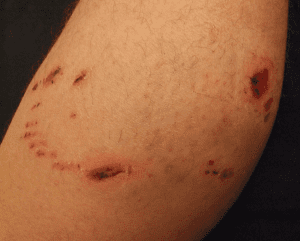Being bitten by a dog in Denver is a traumatic experience, but by following these steps, you can protect your health and your legal rights.
Dog bites can cause serious injuries, both physically and emotionally. In Denver, as in many other places, dog owners are responsible for the actions of their pets, including any attacks that result in injury. If you or a loved one has been bitten by a dog, it’s important to know what steps to take to protect your health and your legal rights. A Denver dog bite lawyer can help guide you through the complex process of filing a claim and securing compensation for your injuries.
In the aftermath of a dog bite, it’s essential to take immediate action to address the injury and document the circumstances surrounding the attack. Many people are unsure of what to do following a dog bite, especially if the injury is minor or the dog appears friendly. However, even minor dog bites can lead to serious health issues, including infections, rabies, and long-term scarring. By following the right steps after a dog bite, you can ensure that you receive the medical care and legal compensation you deserve.
Step 1: Seek Medical Attention Immediately
The first thing you should do after being bitten by a dog is to seek medical attention, even if the wound seems minor. Dog bites can cause infections, and some dogs carry diseases such as rabies that can be transmitted through their saliva. Even small puncture wounds or scratches can lead to complications if not treated promptly.
- Clean the Wound: If possible, clean the bite area immediately with soap and water to reduce the risk of infection. Applying an antiseptic and covering the wound with a clean bandage can help until you reach a medical professional.
- See a Doctor: Visit your healthcare provider or go to the emergency room as soon as possible. A doctor will evaluate the severity of the bite and determine the appropriate treatment. This may include a tetanus shot, antibiotics to prevent infection, or a rabies vaccination if the dog’s vaccination status is unknown.
If you don’t seek medical attention promptly, it could lead to further complications and affect your ability to claim compensation for medical expenses later on. This is why it’s critical to take the injury seriously from the moment it happens.
Step 2: Identify the Dog and Its Owner
It’s important to gather as much information as possible about the dog that bit you, including identifying the breed, size, and color of the animal. If the dog is accompanied by an owner, ask for their contact information, including their name, address, phone number, and insurance details. Additionally, try to find out if the dog has a history of aggressive behavior or past incidents involving bites.
If the dog is a stray or if the owner cannot be identified, report the incident to local animal control authorities. Animal control can assist in locating the dog and determining whether it has been vaccinated for rabies. This is crucial, as rabies is a fatal disease that can be transmitted through bites from infected animals.
In many cases, a Denver dog bite lawyer can help you track down the responsible party and ensure that they are held accountable for their pet’s actions. If the dog is a known threat, or if the owner failed to properly control their pet, you may be entitled to compensation for your injuries.
Step 3: Document the Incident
Documenting the details of the dog bite incident is essential, as this information can support your case in the event of a lawsuit or insurance claim. Keep a detailed record of the following:
- Date, time, and location: Note when and where the attack occurred, as well as any factors that may have contributed to the bite, such as the dog’s behavior before the attack.
- Witnesses: If there were any witnesses to the incident, obtain their names and contact information. Their testimony can be valuable in corroborating your account of the attack.
- Injuries: Take photographs of your injuries as soon as possible, both right after the attack and during the healing process. This can help document the extent of the damage and how the injury progresses over time.
- Medical treatment: Keep a record of all medical treatment you receive, including doctor visits, medications, and hospital stays. This documentation will be vital for proving the severity of your injury and the costs involved.
A thorough documentation of the incident will not only support your case but also help prevent disputes over the facts if the dog owner or their insurance company contests your claim.
Step 4: Report the Incident to Authorities
In Denver, dog bite incidents must be reported to animal control or the local police, especially if the dog is unlicensed or if the owner is uncooperative. The authorities will investigate the situation and may take action against the dog owner if the pet is deemed dangerous or if the owner was negligent in controlling the dog.
Reporting the incident also creates an official record of the attack, which can be helpful for legal or insurance purposes. Animal control authorities will likely inspect the dog’s vaccination records and may require the dog to be quarantined for observation to rule out rabies.
Step 5: Consult with a Denver Dog Bite Lawyer
If you’ve been injured by a dog bite, consulting with a Denver dog bite lawyer is a critical step in protecting your legal rights. A lawyer who specializes in personal injury law, particularly dog bite cases, can help you navigate the complex process of filing a claim against the dog’s owner or their insurance company.
In Colorado, dog owners can be held liable for injuries caused by their pets, especially if the dog has a history of aggressive behavior or if the owner was negligent in controlling the animal. Your lawyer will investigate the circumstances surrounding the bite, gather evidence, and work with medical professionals to assess the extent of your injuries. They will also negotiate with insurance companies on your behalf and ensure that you receive fair compensation for your medical expenses, pain and suffering, lost wages, and any other damages you may have incurred.
A dog bite lawyer can also help determine if the dog’s owner has violated any local ordinances, which could increase your chances of receiving compensation. If the dog had been previously deemed dangerous or if the owner failed to keep the dog on a leash or in a secure yard, your lawyer may be able to build a stronger case for negligence.
Step 6: Consider Filing a Claim or Lawsuit
If negotiations with the dog owner’s insurance company don’t result in a fair settlement, your lawyer may advise you to file a lawsuit. In Colorado, the statute of limitations for personal injury claims is typically two years from the date of the injury. However, it’s always best to consult with your attorney as soon as possible to ensure you don’t miss any important deadlines.
During the legal process, your lawyer will present evidence, including your medical records, photographs of your injuries, witness testimony, and the dog’s history. They will work to prove that the dog’s owner is liable for your injuries and seek compensation for the damages you’ve suffered.
Step 7: Follow Up on Your Medical Treatment
It’s important to continue following your doctor’s instructions and attending follow-up appointments to monitor your recovery. If your injury requires additional surgeries or treatments, make sure to document these costs. Ongoing medical care and potential future treatment should be factored into your claim to ensure that you are fully compensated.

Dog bite injuries can lead to long-term physical and emotional scars, and it’s essential to address both in your claim. Your lawyer can help ensure that all aspects of your injury, including emotional trauma, are considered when calculating the compensation you’re entitled to receive.
Conclusion
Being bitten by a dog in Denver is a traumatic experience, but by following these steps, you can protect your health and your legal rights. From seeking immediate medical attention to consulting with a Denver dog bite lawyer, taking action quickly can help ensure that you receive the compensation you deserve. Whether you’re dealing with medical expenses, lost wages, or pain and suffering, a lawyer can help you navigate the legal process and hold the responsible party accountable for their actions.


Join the conversation!